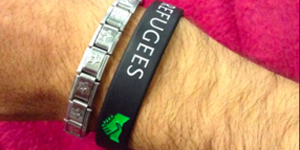
What can we do about the refugee crisis? More than you might think.
Cate Newsom | NOVEMBER 24, 2015
LAST WEEK AFTER the terrible, terrible news from France, Egypt, Kenya, Syria, among others, the following Mister Rogers quote was circulating on Facebook:
“When I was a boy and I would see scary things in the news, my mother would say to me, ‘Look for the helpers. You will always find people who are helping.”
Most British people haven’t had the chance to see Mister Rogers in his heyday, but many online got behind this message, anyway – because, as ever, he had a point.
We’ve been so fortunate at Evviva, as the brand shop for people brands, to be tasked with working with client companies that value people, that empower their employees and abolish fear in the workplace. We’ve supported clients through some tense times in different parts of the globe, and each time we’ve been overwhelmed by the resilience and dedication of the people we’ve met, and the commitment our client companies’ employees have made to help make things better.
Now we’re all facing a rather scary time, after so many senseless acts of violence, but we also see so many helpers in our own communities. Last week in Scotland, home of Evviva Ltd, the first 100 Syrian refugees destined for the UK touched down in Glasgow, and so far the welcome (unlike the weather) has been warm. In the next weeks, Scotland will take in 1/3 of the first 1000 refugees brought to the UK from refugee camps. There are a few things we can all do to help.
How can we help? First, of course, we can be good, caring neighbours. (Mister Rogers has a lot to say about that, too.) We can support those organizations that provide direct practical and informational help to refugees. A few voluntary sector organizations doing this in the UK are Refugee Action and Refugee Council and Scottish Refugee Council. Finally, and perhaps offering the biggest impact for companies, we can take steps to make our recruitment and hiring initiatives inclusive of refugees. Oranisations that do will find they’re tapping a market of people who bring a breadth of experience and skills, and are very eager to work and contribute.
Building on what we’ve learned from successful initiatives to support military veterans’ transition to civilian employment, there are a few important steps for making an organisation’s recruitment efforts more inclusive of refugees.
Refugee-inclusive recruitment: A few ideas
1) Use social media. Broadcast opportunities on your social media channels. Many asylum seekers are active on social networking sites like Twitter and Facebook.
2) Connect with the third sector.
3) Make job descriptions descriptive. Use straightforward terms to describe the job, avoiding jargon and acronyms Are there industrial certifications on a job description that are easily obtained by skilled practitioners? Try making them optional, and require only the expertise and years of experience; that way an experienced but newly arrived practitioner can still apply for the job, and certify later.
4) Offer paid internships. In roles where more extensive on-the-job training might be necessary, consider offering a paid internship that could be changed to a permanent position upon completion.
There will be challenges. For one, for the employer to satisfy the requirement to ascertain a potential hire’s right to work in the UK can be a bit trickier with a refugee hire, whose paperwork is more complex. This document provides the details of acceptable documentation for verifying refugees’ right to work in the UK. There are also a number of recommendations for onboarding that your organization will want to consider. Evviva will give you some ideas about that in a separate post.
It may take extra effort in the near term, but expanding your recruitment efforts to be inclusive of refugees brings a remarkable return on your investment. On a practical level, your organization will tap an emerging workforce of people with a breadth of skills and experience, and an eagerness to work. If and when you find the right candidate, your workplace will be enriched by someone who brings new perspective and new ideas, fluency in foreign language(s) and an international network. You will also be supporting your local community and your global community at one of those difficult times, by being some of the people who are helping.
Now, where’s my cardigan…?


Submit a Comment